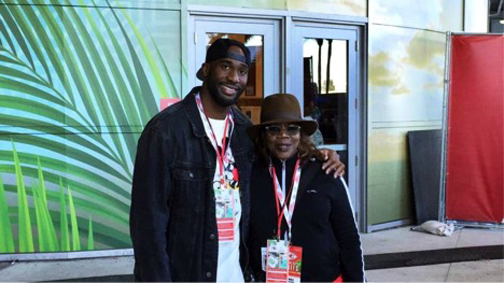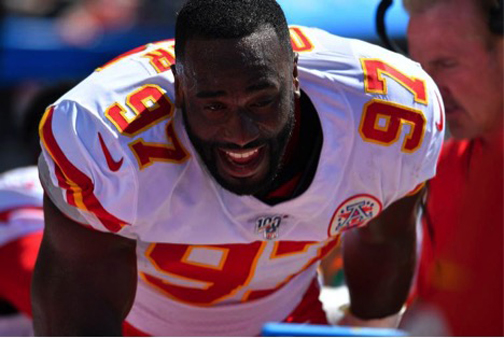
Alex Okafor is a defensive end for the Kansas City Chiefs, former Texas Longhorn and
native of East Texas. His girlfriend is CV High School graduate Kaylee Lumsden. Okafor wrote the following, which was originally published in the Kansas City Star and Fort Worth Star-Telegram.
After an injury in Week 15 of the 2019 season, I watched from the stands with my parents as my Kansas City Chiefs win the Super Bowl.
It was a heartfelt experience. There’s nothing that I wanted more than to be on the field, battling with my teammates. But being able to watch our team win, with my parents next to me, is an experience that I wouldn’t trade for the world. I wish time would have stopped and we could live in that moment forever.
Just a few months later, Mom was in the hospital, diagnosed with acute myeloid leukemia. Because of coronavirus restrictions, we could not visit her in the hospital during her chemotherapy. Within three weeks, at only age 59, she was gone.
Soon after, so were three more African-Americans: Ahmaud Arbery, Breonna Taylor and George Floyd. At this point, I was about to melt down. The pain from my mother’s death was sitting heavily on me, not to mention the rage that took over since these slaughters. I was overwhelmed with so many emotions; all I wanted to do was crawl into a cave and hide while the rest of the world burned down.
Then I thought to myself, “What would Mom have done?”
Sonia Danette Alexander Okafor has always been my biggest role model. She grew up in East Texas, lost her mom at age 9, and went to Grambling State University, majoring in criminal justice. She had grown up in the civil rights movement and experienced a lot of racial trauma post-segregation. She always made my brother and me aware of the racial injustices in this country. She did her best to prepare us for the obstacles to being Black in the suburbs of Texas: Don’t stay out too late. Don’t wear durags in public. Drive carefully while passing through Williamson County. Put both hands on the steering wheel when being pulled over by the cops.
She stopped at nothing to assure everyone in my family excelled. She had a kind heart and was always trying to improve society. She worked as a probation officer for 11 years and was certified as an alcohol- and drug-abuse counselor. Later, she worked for a nonprofit organization finding housing for underprivileged families. I’m sure if she were alive today, she would say we need more organizations as such to help level the playing field.
She was one of the most courageous people I knew. My dad moved from Nigeria at 19 and met my mom at Grambling. Shortly after marriage, his mother got sick and he wanted to bring her to the states for better medical care. But he wasn’t a U.S. citizen yet, so Mom volunteered to bring my grandma back. My mom had never been to Nigeria, and the area my dad grew up in wasn’t safe for foreigners.
Nevertheless, she went and brought my grandma back seamlessly. That kind of courage and selflessness are what we need right now.
We also need more of her tolerance. Which reminds me of the story in which my dad brought home goat meat for the first time. In Nigeria, the head of a goat is considered a delicacy; my dad was saving it for a special occasion. When Mom opened the freezer door, she screamed: A goat’s head was staring back at her! Initially, she was terrified, but she made it a point to learn about the Nigerian culture so she could understand my dad’s upbringing. (She eventually came to eat goat meat but never would try that goat head.) She knew it wasn’t fair to judge my dad without truly understanding where he came from.
We as a nation need to come together to learn more about one another’s upbringing. The more we learn, the more sensitive we will be to other demographics’ struggles.
Mom was a huge fan of Oprah Winfrey. She recorded every episode of her show and bought all of her magazines. Nowadays, I get emotional every time I see or hear someone mention Oprah. I see my mom in her. Both are strong Black women who strive to make this world a better place. Oprah once advocated, “Turn your wounds into wisdom.” This resonates with me because if Mom were alive, I believe this would be her advice for our country. We must learn from the recent murders if we want to end systemic racism in the United States.
After Mom passed away, I vowed that I would stop at nothing to make her proud. I’ll be the best man I can be while honoring her to the fullest. The first big step is making a legitimate effort to end racism in this country. As much as I wanted to cut off all news networks and social media outlets so that I could mourn in peace, I knew this is not what Mom would have wanted. Because of her, I’m writing this article. Because of her, I wanted to have this uncomfortable conversation about racism and inequality.
Mom worked as an alcohol- and drug-abuse counselor for 11 years. There’s a term in that field known as “emotional sobriety.” In order for the Black community to take the next step, we must embrace these emotions of anger. We have to address our pain and agony in a way in which it doesn’t eat at us anymore, but motivates us to take care of our own. We must practice emotional sobriety so that we can take these negative emotions and channel them into concise and conscious efforts. This includes voting, and not just in the Presidential election.
Mom always urged me to go vote. If I had time in my schedule I would, but I never took it seriously. If I voted it was only because Mom kept bugging me. Growing up, mom used to always say, “If you don’t like what’s going on in your life, what do you plan to do about it?” Well, since my mother is no longer here to pressure me every election, I must take it upon myself to vote while encouraging others to do the same.
Mom, I love you. I’m more determined than ever to continue your work in creating a better society, a better America.
Reprinted with permission by Kansas City Star and Alex OKAFOR

